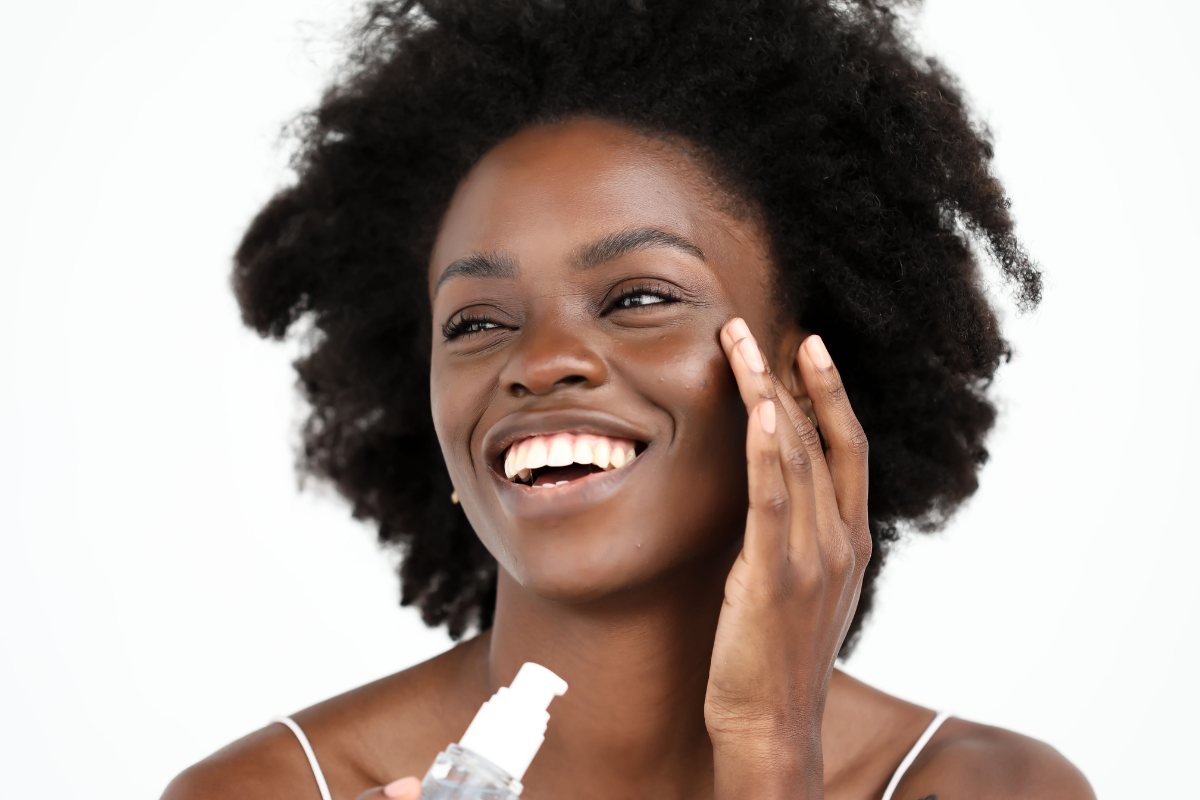
Top Black Skincare Questions Answered: Expert Advice for Radiant Skin
Be kind to your melanated skin. The richness and beauty of melanin-rich skin also comes with specific challenges that need to be catered to, such as hyperpigmentation, texture, keloids, and razor bumps. The quest for radiant, healthy skin knows no bounds, and we're here to answer the top black skincare questions with insights from our experts.
1. How to Get Rid of Hyperpigmentation on Black Skin?
Hyperpigmentation, characterized by dark spots or patches, is a common concern for individuals with melanated skin. To effectively combat this issue, incorporate skincare products containing potent ingredients such as vitamin C, niacinamide, licorice root extract, and kojic acid into your routine. These ingredients help lighten dark spots and even out skin tone over time. Notably, licorice extract also inhibits the enzyme responsible for melanin production. Additionally, consistent use of sunscreen with SPF 30 or higher is crucial to prevent further pigmentation and protect your skin from harmful UV rays.
2. What Are the Best Moisturizers for Black Skin?
Moisturizing is essential for maintaining healthy, hydrated skin, especially for individuals with black skin prone to dryness. Look for moisturizers enriched with hydrating ingredients like hyaluronic acid, shea butter, or glycerin to replenish moisture levels and prevent dry, ashy skin. Opt for non-comedogenic formulas to avoid clogging pores and choose products specifically formulated for your skin type, whether it's oily, combination, or sensitive.
3. How to Prevent Razor Bumps and Ingrown Hairs for Black Men?

Melanated skin often struggles with razor bumps and ingrown hairs, particularly due to curly hair texture and frequent shaving. Studies show that curly hair is 50 times more likely than straight hair to become ingrown. As hair curls back into skin, they can cause irritation and the body responds by producing collagen, AKA razor bumps or keloids.
To minimize these issues, follow proper shaving techniques, including using a sharp, clean razor and shaving in the direction of hair growth. Consider using pre-shave oils or gels to soften hair and reduce friction during shaving. After shaving, apply soothing products containing ingredients like witch hazel, or tea tree oil to calm irritation and prevent ingrown hairs. Ingrown hair treatments should include ingredients like glycolic acid, salicylic acid, willow bark, and niacinamide.
4. What Skincare Ingredients Should I Avoid for Black Skin?
While many skincare ingredients offer beneficial effects, some may be harsh or irritating, particularly for individuals with black skin. Avoid products containing high concentrations of alcohol, irritating fragrances, or artificial dyes, as these can strip moisture from the skin and cause inflammation. Additionally, steer clear of harsh exfoliants like physical scrubs or products containing microbeads, as these can exacerbate hyperpigmentation and damage the skin barrier. Instead, opt for enzymatic exfoliators.
5. How Can I Build an Effective Skincare Routine for Black Skin?
Building an effective skincare routine tailored to black skin involves understanding your specific needs and concerns. Start with a gentle cleanser to remove impurities without stripping the skin's natural oils. Follow with targeted treatments such as serums or essences to address concerns like hyperpigmentation or acne. Finally, moisturize with a hydrating cream and always finish with sunscreen during the day to protect against sun damage and premature aging.
6. How do I get rid of dark inner thighs, armpits, and private areas?
Addressing concerns regarding darkened skin in intimate areas like inner thighs, armpits, and private areas are very common. Incorporating targeted skincare solutions into your routine can help. Opt for gentle exfoliation using products containing ingredients such as alpha hydroxy acids (AHAs) or salicylic acid to remove dead skin cells and promote cell turnover, which can gradually lighten darkened areas. Additionally, consider using brightening creams or serums enriched with potent ingredients like vitamin C, licorice extract, or niacinamide to even out skin tone and reduce pigmentation. Regular moisturizing with hydrating creams or oils can also help maintain skin health and prevent further darkening. However, it's crucial to practice caution and choose products specifically formulated for sensitive areas to avoid irritation or adverse reactions.
7. What Are Keloids and How Do They Affect Black Skin?
Keloids are raised scars that occur when the skin overreacts to trauma, such as cuts, burns, or acne. They are particularly prevalent in African, Asian, Latino, and Mediterranean descent due to genetic predisposition and increased melanin production. Individuals with black skin are statistically prone to keloid formation at rates approximately 15 times higher than those observed in individuals with Caucasian skin. Keloids may appear as thick, lumpy growths that extend beyond the boundaries of the original wound and can be itchy, tender, or even painful.
Preventing keloids involves minimizing trauma to the skin and taking steps to promote healthy wound healing. Hence why they usually form after getting pierced or tattooed! Keeping the area clean and moist, can aid in preventing keloids. If you are prone to keloids, consult with a dermatologist for personalized recommendations and treatment options. Managing keloids requires careful attention and may involve various treatment options, including steroid injections, laser therapy, or surgical excision.
8. Why Is Sunscreen Important for Black Skin?

Although melanated-rich skin offers inherent sun protection, you still need to protect it! Sun protection serves as a vital shield against harmful UV radiation and skin cancer. POC often overlook this common misconception, melanoma can still appear on any skin type. Yes, it’s crucial to wear it even on cloudy days and indoors. In most recent years, studies show blue light causing photoaging in skin.
Remember to prioritize consistency and patience as you embark on your skincare journey, and don't hesitate to seek professional guidance if needed. At MIRACO Beauty, we're dedicated to helping you unlock your skin's full potential and embrace your natural beauty.
Comments (0)
Back to MIRACO BEAUTY BLOG